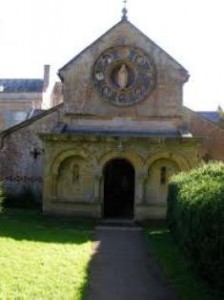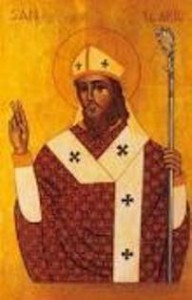In the 1950′s, circumstances took our family to live in a lovely Dorset village called Chideock, situated on the coast road from Bridport to Lyme Regis. Very unusually for the West Country, there is a small Catholic Church in that village, where my brother and I used to serve Mass.
 |
Chideock Catholic Church
I remember one day, cycling as we did from Church to home, possibly a 2 miles journey, and feeling very afraid of God. I had said something silly, about one of the cloths the priest uses at Mass. Knowing that God sees everything, and watches my every move, even my thoughts, and having little idea of God, save as a vengeful God, I was sure that God was very angry with me, and I cried in terror, cycling all the way home.
 |
Cycling in Dorset
In those days, many people would be at Church on Sundays. All over England it was the same, and there would be families with 2, 3 or 4 children, who would sit in the same pews, each Sunday, at Mass. I am pretty sure, that most fairly straight-forward and simple people felt, that if they did not attend Mass on Sundays, God would be angry with them, and they were afraid to go to hell, in a state of mortal sin; that was the common, widely-held idea.
Later on, when I became a monk and a priest, in 1961, I thought to myself that I would love to make a mark, for good in this world, especially to help people know, and love God, within the Church. However, I had little idea of my own limitations, weaknesses and, perhaps, age-related priggishness; yet, although that idea has never gone away, it has always proved too difficult a task.
One train of thought, however, remained ‘nagging me’ after the Vatican Council – an exciting time to be alive in the 1960′s – that a kind of ‘terror’ of the Lord was what had kept many people quite closely linked to the Church; from that epoch onwards – and I suspect there was a link with the Vatican Council – that ‘terror’ has quickly diminished, until today, 50 years later, it has all but disappeared. Still, in the Scriptures we find, insistently, “The fear of the Lord is the beginning of Wisdom”. What does this excerpt mean? And, if people were not to have this ‘terror’, what might replace it? Surely, something was needed to give people inner motivation to link themselves to God, within the institution of the Church, and that ‘something’ needs to be both simple and effective. What could that ‘something’ be? The answer has always eluded me, at least within the kind of culture in which we live. The Church with its rules and its liturgy, in today’s world, seems largely irrelevant to the majority, and especially the young, as those ‘faithful’ people that do still come to Mass, are, generally, of an older generation. On reflection, there seems little chance of my early dream as a young monk, helping many to know, and love, God in the Church, coming to fruition.
My own personal faith in God, and the Church, has grown stronger over the years. I have found the presence of Jesus, within me, and within the community, when ‘two or more are united’ in the name of Jesus. In that presence, there is the full meaning of life, because Jesus is Love, and He said of Himself, without boasting, that He ‘… is the Way, the Truth and the Life’. If a person finds Him, nothing else is needed. That presence of Jesus is not to be taken lightly; it cannot be assumed to be there, just because we come together in liturgy, for a prayer meeting, or for some other ‘churchy’ event. For example, a person may be present who is ‘seething with anger’, against you, and the problem may be still unresolved. Jesus may not be present, even when a group of priests, or religious men or women, are in the same room. His presence does require a proper, conscious relationship, in God, among all present.
 |
St. Hilary of Poitiers
With all this in mind, what a joy it was, for me, recently, to read at the Office of Readings, from St. Hilary of Poitiers, about the true meaning of ‘fear of the Lord’! Here it is pointed out that we have to ‘learn how to fear the Lord’. Success takes time and effort, and is very much linked with learning the true meaning of ‘Love’. It needs also a living and enlightening experience. ‘Fear of the Lord’ is quite different to ‘terror of the Lord’, or any other kind of terror. Possibly, what I had experienced 60 years ago, in Dorset, was nothing to do with genuine ‘fear of the Lord’, and, precisely, because of that, it must be rejected; many of our contemporaries, today, seem to have rejected ‘terror of the Lord’, but have not found the beginning of ‘Wisdom, genuine fear of the Lord’. I fear therefore they may have not entered into any real relationship with God at all.
Below is what St. Hilary of Poitiers (300-360 AD) wrote:
The meaning of “the fear of the Lord”:
“Blessed are those who fear the Lord, who walk in his ways. Notice that when Scripture speaks of the fear of the Lord it does not leave the phrase in isolation, as if it were a complete summary of faith. No, many things are added to it, or are presupposed by it. From these we may learn its meaning and excellence. In the book of Proverbs, Solomon tells us: If you cry out for wisdom and raise your voice for understanding, if you look for it as for silver and search for it as for treasure, then you will understand the fear of the Lord. We see here the difficult journey we must undertake before we can arrive at the fear of the Lord.
We must begin by crying out for wisdom. We must hand over to our intellect the duty of making every decision. We must look for wisdom and search for it. Then we must understand the fear of the Lord.
“Fear” is not to be taken in the sense that common usage gives it. Fear in this ordinary sense is the trepidation our weak humanity feels when it is afraid of suffering something it does not want to happen. We are afraid, or are made afraid, because of a guilty conscience, the rights of someone more powerful and an attack from one who is stronger, sickness, encountering a wild beast, suffering evil in any form. This kind of fear is not taught: it happens because we are weak. We do not have to learn what we should fear: objects of fear bring their own terror with them.
But of the fear of the Lord this is what is written: Come, my children, listen to me, I shall teach you the fear of the Lord. The fear of the Lord has then to be learned because it can be taught. It does not lie in terror, but in something that can be taught. It does not arise from the fearfulness of our nature; it has to be acquired by obedience to the commandments, by holiness of life and by knowledge of the truth.
For us the fear of God consists wholly in love, and perfect love of God brings our fear of him to its perfection. Our love for God is entrusted with its own responsibility: to observe his counsels, to obey his laws, to trust his promises. Let us hear what Scripture says: And now, Israel, what does the Lord your God ask of you except to fear the Lord your God and walk in all his ways and love him and keep his commandments, with your whole heart and your whole soul, so that it may be well for you?
The ways of the Lord are many, though he is himself the way. When he speaks of himself he calls himself the way and shows us the reason why he called himself the way: No one can come to the Father except through me.
We must ask for these many ways, to find the one that is good. That is, we shall find the one way of eternal life through the guidance of many teachers. These ways are found in the law, in the prophets, in the gospels, in the writings of the apostles, in the different good works by which we fulfill the commandments. Blessed are those who walk these ways in the fear of the Lord.”
I would have the boldness to add to St. Hilary’s list – though to be fair he does write, ‘the ways of the Lord are many’ – that we need to discover, pray for, and earnestly desire, within the Community of the Church, the Love that is the Lord, and that will satisfy us. The Second Vatican Council, this year, is celebrating its Golden Jubilee of inauguration, in 1962. The teaching of that Council of the Church is directed to, “living the Gospel”, “living in communion with God and others”, “and moving in the direction of Hope and not Fear”. Another way of putting it, would be a discovery of a real, “Family to which we all belong – in God – in the Church”. Having such an experience will give the inner motivation to you and me, to rejoice in the relationship with God so that we will experience, and to find that for which we are searching. Also, to have the ‘right’ ‘fear of the Lord’, expressed in awe and wonder, at the majesty of God. In the end, my longing as a young monk was rather misplaced. The young Brother Jonathan thought he could help people to know, and love God, in the Church. The one that does such things is God, himself, and no other; in peace and tranquility, you and I can leave it to Him.
To get round the problem of disrupted formatting of the blog, readers are advised to visit the main blog site.
